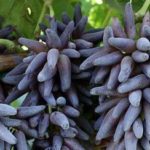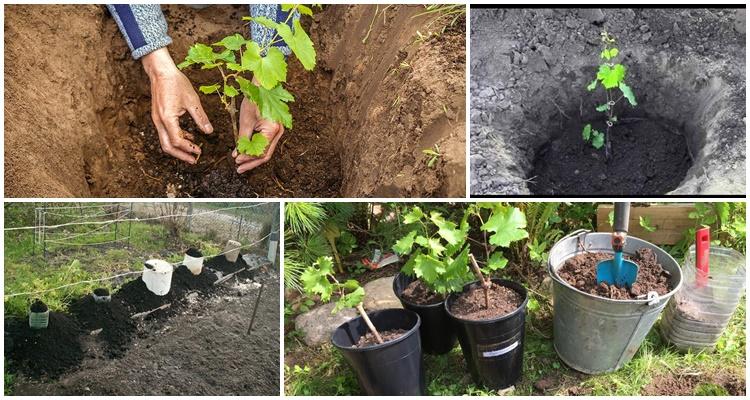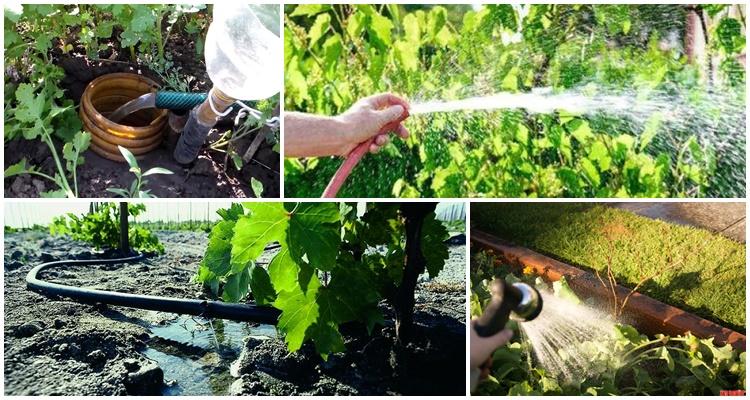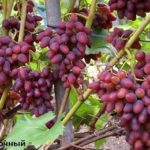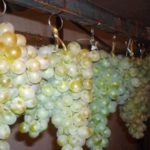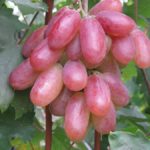Seedless grape varieties are especially popular among gardeners for their taste. Not every variety takes root in the domestic climate, but, thanks to the work of breeders, today every summer resident living in the middle zone can grow seedless berries. The Black Finger grape variety is considered the largest among the seedless varieties and has a late ripening period.
- About the creation of Black finger grapes
- Description and characteristics
- Pros and cons of the variety
- Features of growing crops
- When is the best time to plant
- Where to plant on the site
- How to plant
- How to care for the variety
- Watering and fertilizers
- How to prune
- Susceptibility to diseases and pests
- Collection and storage
About the creation of Black finger grapes
The raisin variety of grapes is popular due to the absence of seeds. However, it also has disadvantages - the small size of the berries, not exceeding 3 grams by weight. Scientists from the Israeli Center for Heredity and Variation managed to create a hybrid that has no seeds and is at the same time large in size.
There is an opinion that biotechnology was used when developing a new variety. There was also a version that such grapes are a product of genetic engineering.
Description and characteristics
A brief description and characteristics of the Black Finger table grapes are as follows:
- The ripening period is late, from the beginning of the growing season to full ripening it takes 155 days.
- The percentage of sugar content is more than 20.
- Intended for use as food.
- The average weight of one bunch of grapes is about 1500 grams.
- The shape of the bunch is cylindrical, asymmetrical.
- The taste of the fruit is harmonious, pleasant, with subtle nutmeg notes. The skin is dense, but quite edible, and the flesh is sweet and juicy, crispy.
- The shape and weight of the berries are slightly elongated, about 14 grams.
- The color of the fruit is dark purple, almost black.
- Cold resistance - can withstand temperatures down to -22 degrees.
- Transportability is high; grapes can be transported over long distances without losing their presentation.
Pros and cons of the variety
Those who have already tried to grow Black Finger sultanas in their garden plots have noted the advantages and disadvantages of the hybrid.
Features of growing crops
The Black Finger raisin grape was created by breeders for cultivation in a warm Mediterranean climate, so the hybrid is not suitable for cultivation in northern regions, where there is a significant decrease in temperature in winter. Even in the middle zone, the crop will have to be significantly insulated before the onset of cold weather.
When is the best time to plant
Planting Black Finger grape seedlings is allowed both in spring and early autumn, it all depends on the growing region. In the southern regions, preference is given to autumn planting, and in regions with a cool climate, work is carried out in the spring, in which case the young bushes will have time to adapt to the new place.
Where to plant on the site
For planting, select a site on a small hill so that groundwater in rainy summers does not damage the roots of the crop.
How to plant
A week before planting, the selected area is dug up and, if necessary, fertilizer is applied. It is also necessary to choose the roots of weeds so that they do not subsequently choke out young grape seedlings.
Planting is carried out according to the following algorithm:
- Holes are dug at a distance of 2 meters from each other, width and depth - 100x100 cm.
- A drainage layer of fine gravel or crushed brick is placed at the bottom of the hole. It will retain moisture and prevent it from spoiling the roots of the crop.
- The selected soil is mixed with nutrients and half is poured into the hole.
- The seedling is placed on a small mound of soil and the roots are carefully straightened in different directions.
- After this, they are sprinkled with the remaining soil, lightly compacted and tied to a support.
- Water the seedling abundantly and spread a layer of mulch consisting of organic materials around it. It will prevent the evaporation of moisture necessary for full rooting, and will not allow weeds to germinate.
How to care for the variety
Without regular care of the hybrid, it is impossible to reap a rich harvest. The vine needs to be watered, fertilized and preventative spraying carried out. Grapes also need sanitary and formative pruning.
Watering and fertilizers
Irrigation is carried out based on the condition of the soil; a dry crust should not be allowed to form. In hot weather, watering is carried out once every 7 days, using about 20 liters of water for each bush. It needs to be heated in the sun. If there are prolonged rains, irrigation is abandoned, since excess moisture leads to the development of dangerous fungal diseases, to which the hybrid has weak immunity.
Feeding begins from the second year. In the spring, nitrogen fertilizers are used, and at the end of summer, potassium and phosphorus fertilizers are used. The formulations are diluted according to the instructions for use included with each fertilizer.
How to prune
It is recommended to grow Black Finger grapes on trellises.Therefore, first, over the course of 4 years, a trunk is formed to the required height, and after that, fruit-bearing side shoots are distributed in a horizontal plane.
Susceptibility to diseases and pests
The hybrid, bred by Israeli specialists, has weak immunity to fungal pathologies. Preventive spraying of the vine is carried out twice a season using fungicidal preparations. Among insects, grapes are attacked by spider mites. Acaricidal compounds are used to control the pest.
Collection and storage
Since Black Finger is a late variety, harvesting begins in early November. Berries can be stored in the refrigerator for 2 weeks.


